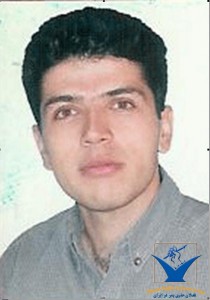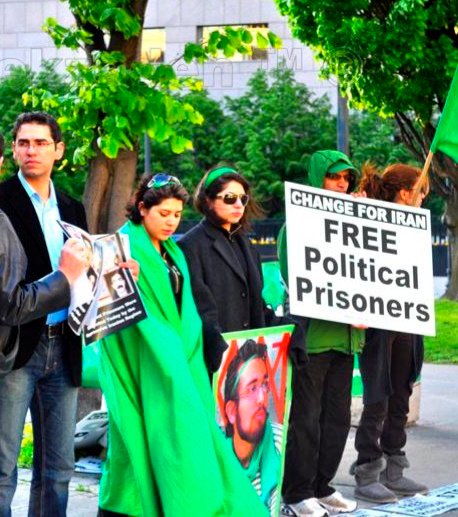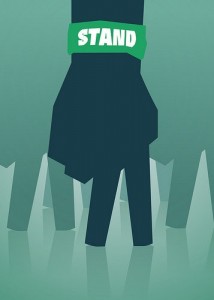Tuesday
May112010
Iran Special: A Renewal of Protest for 12 June?
 Tuesday, May 11, 2010 at 6:57
Tuesday, May 11, 2010 at 6:57
Just over 24 hours ago, we wrote, "Iranians and activists throughout the world responded with sadness and fury to the Sunday morning news that five Iranians...had been executed....But what will the response be inside Iran? Will the hangings provoke public anger or will any display be muted?"
[youtube]http://www.youtube.com/watch?v=wqqsSVWVa1s&feature=player_embedded[/youtube]
We got a partial but vivid answer yesterday. The Tehran Bus Workers Union, as well as labour activists outside Iran, condemned the hangings. Mir Hossein Mousavi issued a statement on "the Judiciary shift[ing] its position from supporting the oppressed toward supporting authorities and those in power....Is this the...justice you were after?"
And then there was the demonstration at Shahid Beheshti University in Tehran. As news leaked that President Ahmadinejad was coming to the campus to speak, the students gathered. They not only gathered; they chanted defiantly. They proclaimed their readiness to sacrifice; they sang songs of unity; they taunted the President. They did so in the face of the security presence and even as the clashes began.
That protest alone resurrected international coverage of Iran as more than a nuclear issue. The 8-minute clip of the chanting and the confrontation with Iran's security troops gave images to reports which had come out in the press, bringing broadcasters like CNN, which had gone to sleep over the post-election developments, to life.
Defenders of the regime will jump in today and claim this was an isolated incident, even as they redouble the loud pronouncements of foreign intrigue and a malevolent opposition. But consider that yesterday's university protest, even if fueled by the news of Sunday's hangings, was not the first one this month. Students at Tehran University also defied the regime crackdown on 1 May, again "welcoming" the President as he tried to seize publicity with a statement from the campus.
That in turn winds the clock back to November-December 2009 when opposition was marked by a series of university demonstrations before, during, or after National Students Day on 7 December. Publicly this kept demands for justice and rights simmering, leading up to the show of resistance against the Government on Ashura (27 December).
And it should never be forgotten that the public display is not and will not be the sum total of discontent with and challenge to the regime. The simple formula of Greens v. Ahmadinejad ignores the strands of pressure upon the President, coming not only from "reformists" but from other politicians, clerics, and even the "conservative" establishment. While the Green Movement has supposedly crumbled after 11 February, more blows have been thrown against Ahmadinejad over his economic plans, the supposed corruption and mismanagement of allies including his First Vice President and his Chief of Staff, and the handling of the post-election crisis.
The image of a revival of direct opposition to the President, even if it is "only" on a university campus, buttresses the political foundations for that assault upon Mahmoud. Thus the significance of the coincidence that the Shahid Beheshti demonstration occurred as former President Hashemi Rafsanjani was resurfacing with the pointed declaration that his 17 July Friday Prayers, which was accompanied by large demonstrations, still contained the solution for this crisis.
Will it do the same this time, as the clock now ticks toward the 1st anniversary of the Presidential election on 12 June? Too soon to tell. However, I have to raise a bit of a smile that yesterday's events came only hours after an analyst for Al Jazeera English, Massoud Parsi, declared:
Wrong, wrong, and wrong again. The Fat Lady (and Mahmoud) have not sung. This is not over.
[youtube]http://www.youtube.com/watch?v=wqqsSVWVa1s&feature=player_embedded[/youtube]
UPDATED Iran Video: Protest Against Ahmadinejad at Shahid Beheshti University (10 May)
The Latest from Iran (11 May): Opposition Surfaces
We got a partial but vivid answer yesterday. The Tehran Bus Workers Union, as well as labour activists outside Iran, condemned the hangings. Mir Hossein Mousavi issued a statement on "the Judiciary shift[ing] its position from supporting the oppressed toward supporting authorities and those in power....Is this the...justice you were after?"
And then there was the demonstration at Shahid Beheshti University in Tehran. As news leaked that President Ahmadinejad was coming to the campus to speak, the students gathered. They not only gathered; they chanted defiantly. They proclaimed their readiness to sacrifice; they sang songs of unity; they taunted the President. They did so in the face of the security presence and even as the clashes began.
That protest alone resurrected international coverage of Iran as more than a nuclear issue. The 8-minute clip of the chanting and the confrontation with Iran's security troops gave images to reports which had come out in the press, bringing broadcasters like CNN, which had gone to sleep over the post-election developments, to life.
Defenders of the regime will jump in today and claim this was an isolated incident, even as they redouble the loud pronouncements of foreign intrigue and a malevolent opposition. But consider that yesterday's university protest, even if fueled by the news of Sunday's hangings, was not the first one this month. Students at Tehran University also defied the regime crackdown on 1 May, again "welcoming" the President as he tried to seize publicity with a statement from the campus.
That in turn winds the clock back to November-December 2009 when opposition was marked by a series of university demonstrations before, during, or after National Students Day on 7 December. Publicly this kept demands for justice and rights simmering, leading up to the show of resistance against the Government on Ashura (27 December).
And it should never be forgotten that the public display is not and will not be the sum total of discontent with and challenge to the regime. The simple formula of Greens v. Ahmadinejad ignores the strands of pressure upon the President, coming not only from "reformists" but from other politicians, clerics, and even the "conservative" establishment. While the Green Movement has supposedly crumbled after 11 February, more blows have been thrown against Ahmadinejad over his economic plans, the supposed corruption and mismanagement of allies including his First Vice President and his Chief of Staff, and the handling of the post-election crisis.
The image of a revival of direct opposition to the President, even if it is "only" on a university campus, buttresses the political foundations for that assault upon Mahmoud. Thus the significance of the coincidence that the Shahid Beheshti demonstration occurred as former President Hashemi Rafsanjani was resurfacing with the pointed declaration that his 17 July Friday Prayers, which was accompanied by large demonstrations, still contained the solution for this crisis.
Will it do the same this time, as the clock now ticks toward the 1st anniversary of the Presidential election on 12 June? Too soon to tell. However, I have to raise a bit of a smile that yesterday's events came only hours after an analyst for Al Jazeera English, Massoud Parsi, declared:
Several months on, Ahmadinejad's government appears to have emerged stronger and more self-confident than it was before the contentious elections....
The government and security forces have managed to suppress any serious challenge to the government and what looked like an increasingly popular movement has withered away as a result of a brutal crackdown and political gamesmanship.
This has been greatly assisted by foreign plots against the regime, which made it much easier for the government to rally support in the face of external threats.
Wrong, wrong, and wrong again. The Fat Lady (and Mahmoud) have not sung. This is not over.



